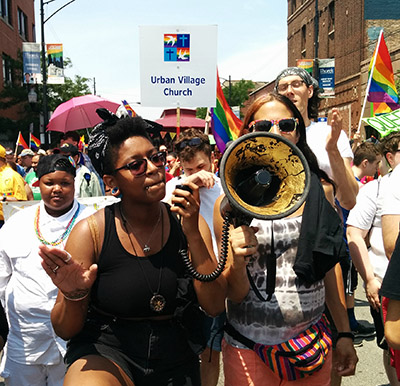
In 1969, drag queen and transgender activist Sylvia Rivera threw a bottle and launched a movement. A raid at the Stonewall Inn in New York City brought a criminalized community to its breaking point, and a rebellion began.
The Stonewall Rioters brought political energy to the gay community and fiercely asserted the value of those whose lives and bodies did not conform to mainstream normativity. Sunday, on the 46th anniversary of the Stonewall Riots, I saw a bottle fly through the air once again, but it wasn’t thrown by a trans woman of color, defending her community against police violence. It was thrown by a reveler at Chicago’s gay Pride Parade, who was apparently unhappy that a Black Lives Matter demonstration had briefly halted the parade with a die-in and speak-out.
The delay had stretched on for about 15 minutes.
I was of course concerned about backlash for some time before that bottle was thrown. Negative attitudes toward young people of color are common enough in Chicago’s Lakeview neighborhood, and Chicago’s Pride Parade has, for years, brought out the kind of gay-for-a-day drunk revelers that could leave a person feeling unsafe, regardless of whether or not they had drawn any attention to themselves. “It’s not even the cops I’m worried about,” I explained to my friends who were organizing the action. “It’s the bros.”
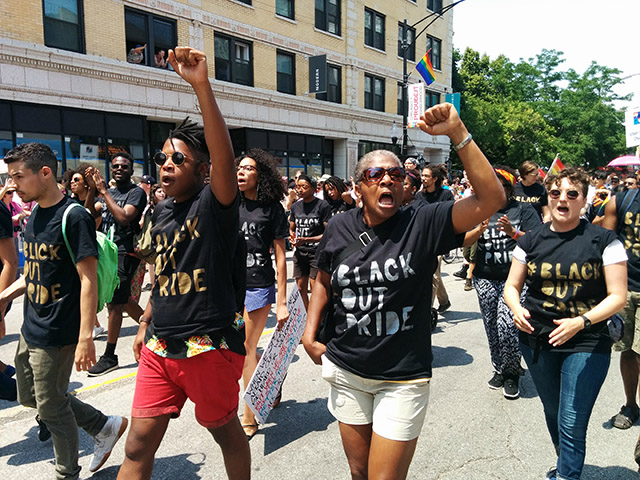 Shortly before reaching the site of the action, participants put on shirts bearing the hashtag of the event. (Photo: Kelly Hayes)
Shortly before reaching the site of the action, participants put on shirts bearing the hashtag of the event. (Photo: Kelly Hayes)
But with the Supreme Court’s decision on Friday, declaring marriage a constitutional right that could not be denied to same-sex couples, my concerns heightened. I imagined a scenario where tempers would flare and no one would actually hear the messaging that these brave young people were formulating.
Black, queer, trans, criminalized – the young people who put together Sunday’s event are living on the front lines of struggle in this country. They are to our times what the early trailblazers of the gay rights movement were to theirs. They have been deemed disposable. The abuse they endure is largely invisibilized. And in the face of state-sanctioned violence, they are not looking to embrace salvation through respectability. They are defending their identities and their communities as having inherent worth, and demanding visibility in a culture that would turn a blind eye to their destruction.
As Jason Tompkins, one of the event’s organizers stated after the action, “I want it to be mundane and unremarkable that black queer and trans folk prioritize their own healing, knowledge production and legacy building in the organizing and mobilizing that we do.”
In their public statement, the organizers of Sunday’s #BlackOutPride event in Chicago noted that, within a few years of the Stonewall Riots, the legacy of the gay rights struggle was already being rewritten with an eye toward assimilation. “By 1973,” the organizers wrote, “only three years after the first march in honor of Stonewall, organization of Pride events around the country were taken over largely by wealthy cisgender gays and lesbians, looking to transform the march that began in New York from political protest to an opportunity for mainstream visibility. That same year – coinciding with homosexuality being removed from the American Psychiatric Association’s list of Mental Disorders and Conditions – trans and gender non-conforming people saw themselves banned from parades and gatherings around the nation.” 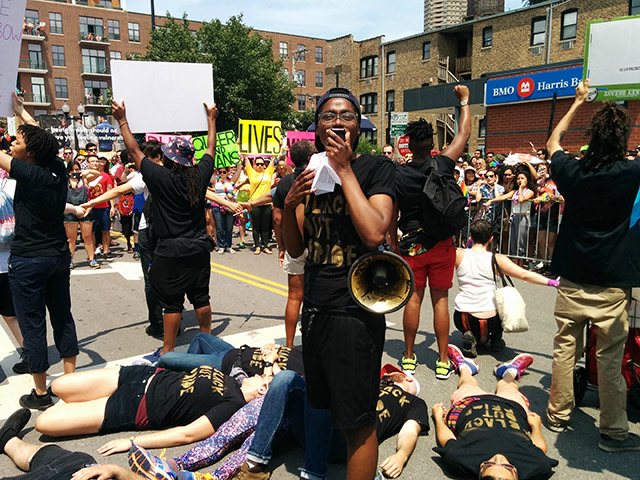 Organizer Nic Kay reads the group’s statement as the action begins. (Photo: Kelly Hayes)
Organizer Nic Kay reads the group’s statement as the action begins. (Photo: Kelly Hayes)
In a struggle to assimilate, there are always leftovers. The organizers of #BlackOutPride argue that the pursuit of a mainstream gay culture led those with greater privilege to effectively banish those who would not or could not conform. Many of those who now occupy a polished neighborhood here in Chicago, where youth of color are increasingly unwelcome, would scoff at – or even throw drinks in the faces of – those who are living the legacy of Sylvia Rivera and Marsha P. Johnson. This was to be expected, but there was no way to know how many of those present would act in such a way and how many might actually show support.
When we approached the appointed intersection, eight participants who had committed to taking an arrest at the action staged a die-in to dramatize the violence that queer Black community members face. They were surrounded by Black organizers holding signs that highlighted the action’s messaging, with non-black allies holding space in a wider circle around them all. A statement was read, explaining the radical history of the day, and why, as more than one sign declared, “Marriage is not enough”:
Queer youth experiencing homelessness, and the plight of trans and queer communities of color, is not merely an issue of transphobia and homophobia in Black and Brown communities; it is equally about classism, racism and gentrification. It is about the draconian measures of austerity that push our people onto the street, refuse us reentrance into real estate and the job market, and the police and prison systems which work together to ensure we stay locked out. Young, Black, Brown, Native, trans, poor, working, immigrant and disabled people are suffering because every system of governance in this country is geared to destroy us.
Members of the trans and Black communities are treated as wholly disposable in this country, as are the Indigenous, marriage or no marriage. This demands action, and it demands that each of us assess where we are standing in relation to the structures that perpetuate oppression and social death.
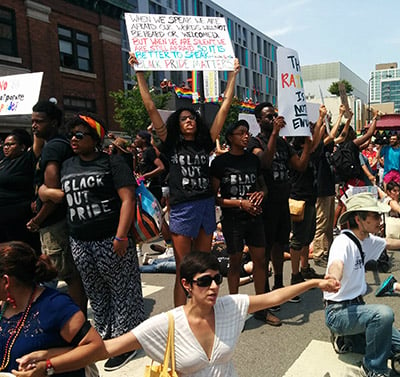 Non-black allies form a supportive circle around the event’s Black organizers. (Photo: Kelly Hayes)Resistance to Black death and racially motivated state violence is one of the greatest social struggles of our time, but the Pride Parade itself includes not only a police float, but also a team of workers, courtesy of the prison industrial complex, to clean up after the revelers. That’s right – if you partied in the streets on Sunday in Chicago, leaving behind bottles and wrappers and beads, workers from Sheriff’s Work Alternative Program (SWAP), who paid for the privilege of picking up your trash rather than spending the day in a cell, undoubtedly cleaned up after you. That’s how far we’ve come from the riotous beginnings of what #BlackOutPride organizer Hannah Baptiste has called “a movement that was born in the spirit of abolition and in pursuit of liberation.”
Non-black allies form a supportive circle around the event’s Black organizers. (Photo: Kelly Hayes)Resistance to Black death and racially motivated state violence is one of the greatest social struggles of our time, but the Pride Parade itself includes not only a police float, but also a team of workers, courtesy of the prison industrial complex, to clean up after the revelers. That’s right – if you partied in the streets on Sunday in Chicago, leaving behind bottles and wrappers and beads, workers from Sheriff’s Work Alternative Program (SWAP), who paid for the privilege of picking up your trash rather than spending the day in a cell, undoubtedly cleaned up after you. That’s how far we’ve come from the riotous beginnings of what #BlackOutPride organizer Hannah Baptiste has called “a movement that was born in the spirit of abolition and in pursuit of liberation.”
Righteous upheaval has given way to a roving party with a slave-labor clean-up crew.
I stress this because I think it’s important to be honest about what was interrupted on Sunday. A group of Black youth didn’t interrupt a gay wedding. They walked into an event that is supposed to mark the anniversary of a moment when the queer community swung back against police violence – an event that is now a celebration of everything from big banks to Budweiser and the police themselves. They entered that space with radical intentions, and did right by the memory of those whose actions the day is actually meant to honor. They called out the names of those who came before and laid out the struggle ahead. And they were heard. Amid the ugliness launched at them by some, there were also numerous cries of love and support.
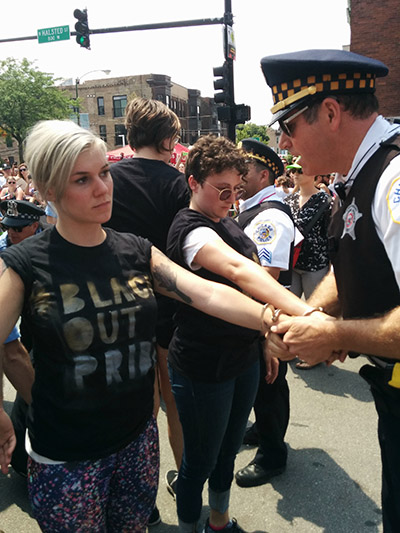 Eight participants were arrested at the action. They have since been released. (Photo: Kelly Hayes)As we exited the scene, after the eight arrestees had been taken and the action had closed, I was rattled by the aggressiveness of some members of the crowd, but I was also deeply touched by those who took a different attitude. Non-black allies tried to surround and protect our Black organizers as we left, with love and also as a demonstration of the care we should show to those most marginalized in our communities. As I saw a few members of the crowd begin to throw their drinks at us, I threw my hands up to try to protect the young Black person in front of me. I didn’t want any harm to come to them because they had chosen to be brave and to say unpopular truths on a day when people wanted to forget them.
Eight participants were arrested at the action. They have since been released. (Photo: Kelly Hayes)As we exited the scene, after the eight arrestees had been taken and the action had closed, I was rattled by the aggressiveness of some members of the crowd, but I was also deeply touched by those who took a different attitude. Non-black allies tried to surround and protect our Black organizers as we left, with love and also as a demonstration of the care we should show to those most marginalized in our communities. As I saw a few members of the crowd begin to throw their drinks at us, I threw my hands up to try to protect the young Black person in front of me. I didn’t want any harm to come to them because they had chosen to be brave and to say unpopular truths on a day when people wanted to forget them.
As we emerged from the crowd, I lowered my hands, and a young Black woman who had watched the action unfold approached us. As she expressed her gratitude, I began to understand what it meant for her, as a young Black woman, to have come to see the parade and to have witnessed this action. As over a million people gathered, her liberation had been called for in a moment of struggle, on the anniversary of the Stonewall Riots. That’s what I will try to carry with me as I look forward, and contemplate my role in an intersectional movement for queer liberation.
Join us in defending the truth before it’s too late
The future of independent journalism is uncertain, and the consequences of losing it are too grave to ignore. We have hours left to raise the $12,0000 still needed to ensure Truthout remains safe, strong, and free. Every dollar raised goes directly toward the costs of producing news you can trust.
Please give what you can — because by supporting us with a tax-deductible donation, you’re not just preserving a source of news, you’re helping to safeguard what’s left of our democracy.